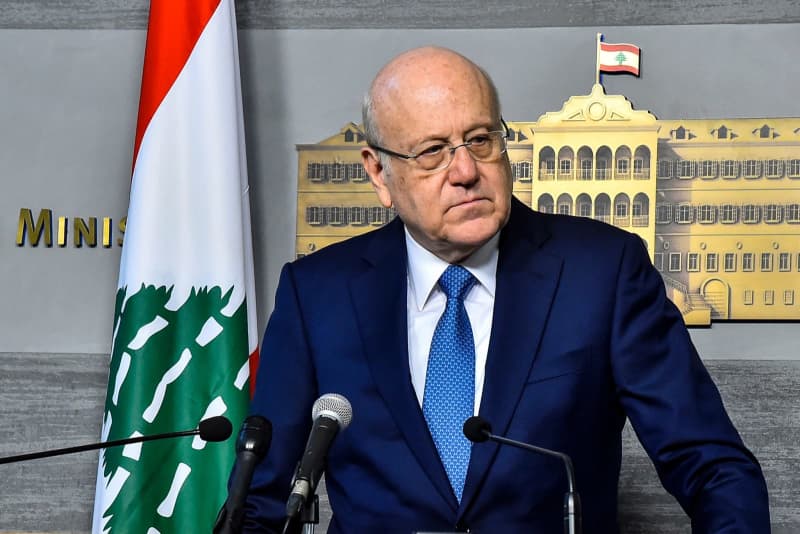On October 27, 2023, Lebanese caretaker Prime Minister Najib Mikati condemned an Israeli airstrike on a residence in the town of Hasbiyya, which reportedly housed journalists, describing it as a “new chapter of war crimes.” This incident occurred amidst intense fighting between Israel and Hezbollah, which has escalated since Hamas launched attacks on October 7. The Lebanese Health Ministry reported that three media workers were killed in the strike, with several others injured. Mikati accused Israel of deliberately targeting journalists to deter coverage of its military actions against Hezbollah. Eyewitness accounts and footage from the incident showed significant destruction, with vehicles marked as press vehicles being damaged or destroyed. Media outlets aligned with Hezbollah also condemned the attack, labeling it a war crime, while there was no immediate response from the Israeli government.
The ongoing conflict has roots in long-standing tensions between Israel and Hezbollah, particularly following the outbreak of violence after Hamas’s unexpected actions in October. Over the past year, sporadic exchanges of fire across the Lebanese-Israeli border have seen hundreds of casualties and significant injuries in Lebanon. As Israeli operations intensified to drive Hezbollah away from the border region, substantial strikes targeted the group’s leadership and resources in Beirut. The resultant humanitarian impact has been severe, with Lebanon’s health sector, already under strain from a prolonged economic crisis, facing devastating losses. As of October 27, at least 163 health workers are reported to have been killed in Israeli attacks, while many healthcare facilities have ceased operations.
The conflict’s toll has not been limited to Lebanon; northern Israel has also experienced casualties, underscoring the violence’s cross-border nature. On the same day as the airstrike, shelling from Lebanon resulted in the deaths of two individuals in the Israeli town of Majd al-Kurm, alongside numerous injuries from shrapnel. Hezbollah claimed responsibility for attacking the adjacent town of Karmiel. Meanwhile, the Israeli military reported the deaths of five of its soldiers in separate incidents within Lebanon, bringing the total fatalities among Israeli troops to 26 since the commencement of ground operations. The situation reflects a rapid escalation in hostilities that heightens fears of wider regional implications.
Reports from UN peacekeeping forces in southern Lebanon revealed ongoing clashes and threats to their safety, as they faced gunfire from Israeli soldiers during routine observations. UNIFIL, the United Nations Interim Force in Lebanon, stated that it has been monitoring increasingly hostile activities, including attacks on its personnel and infrastructure. Various incidents, such as an attempted medical transfer that came under fire, have compounded concerns about security in the operational domain. The UN has reiterated that all parties involved are responsible for ensuring the protection of peacekeepers, asserting its commitment to monitoring the volatile situation despite the perilous operational environment.
As the humanitarian crisis unfolds, the plight of refugees fleeing the escalating violence is dire. The UN refugee agency reported that approximately 430,000 individuals have crossed into Syria since Israeli military actions intensified, contributing to the worsening humanitarian catastrophe there. Amidst ongoing conflict and deteriorating conditions, refugees are entering a country already devastated by civil war. Reports highlight that the majority of Syria’s population requires humanitarian assistance, further complicating the situation for those forced to flee Lebanon. Safety concerns along border crossings have also arisen, heightening the dangers faced by both refugees and UN personnel.
In addition to the humanitarian repercussions, reports indicate that Israeli military operations are targeting Hezbollah’s infrastructure in Syria, particularly around border crossings used as supply routes for the militia. The Israeli military has claimed to have conducted numerous strikes against facilities aimed at limiting Hezbollah’s capacity to bolster its arsenal, while reportedly, over 125 attacks have targeted Syrian locations in 2023 alone. This trend reflects an ongoing strategy to inhibit the expansion of Iranian influence through its allied forces in Syria, particularly in the context of the wider regional instability spurred by the Gaza conflict. The complexities of the geopolitical landscape, marked by competing interests and escalating violence, underscore the critical need for conflict resolution and humanitarian assistance in the region.

